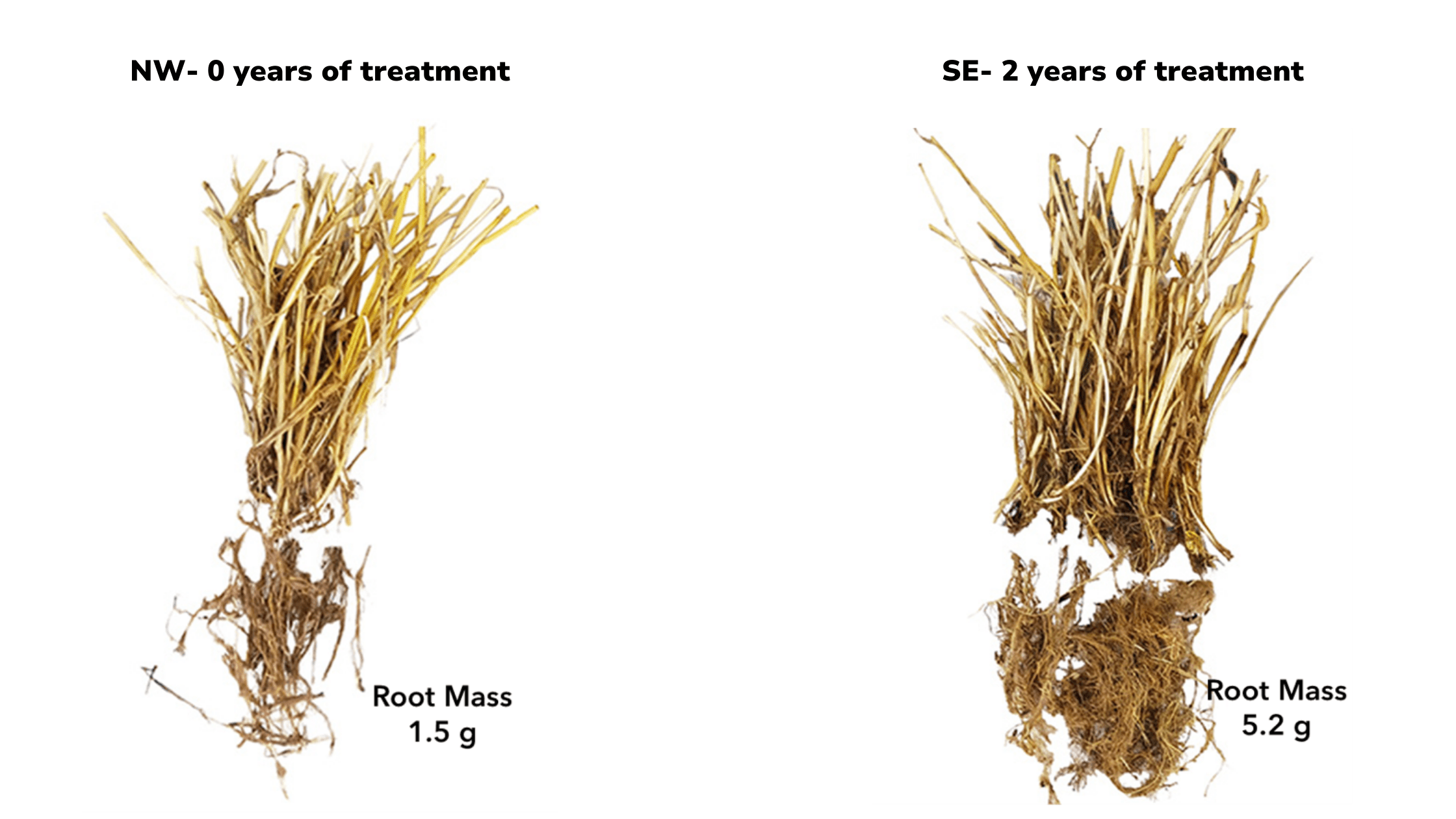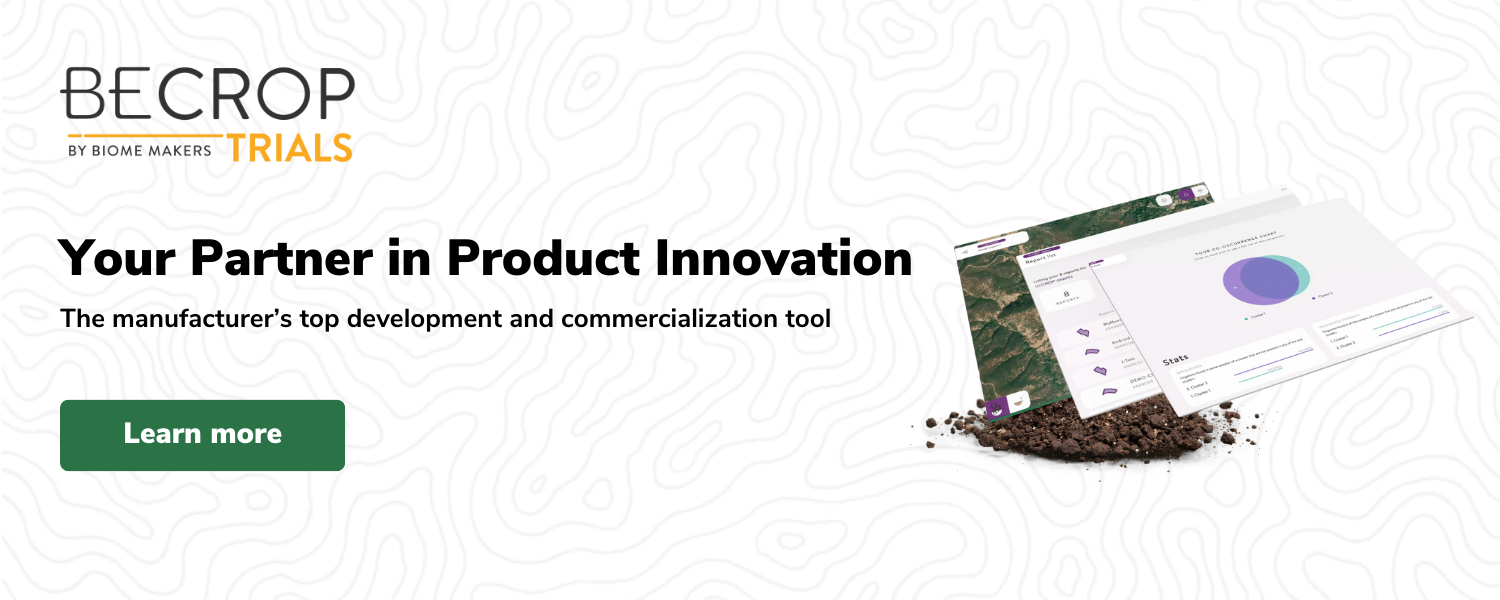Share this
Soil Analysis Accelerates Product Development: Here’s How
by Jamie Nix on 27/Jul/23
Proving a product’s performance is one of the biggest problems faced by biological manufacturers, and it’s our mission to solve it. Biome Makers recently hosted a webinar that demonstrated the far-reaching potential of BeCrop® soil analysis in product development. Industry experts Robin Ross, co-owner of AgNexus Consulting, and Leon Pratchler, CEO of Humaterra, kindly joined us.
With the help of BeCrop® Trials, they were able to understand the success behind their products, accelerate their development, and establish their brands as worthy candidates in the market. In this article, we’ll explore the key themes discussed in the webinar.
Challenges in product development
Validating a product’s performance, carrying out field trials, and differentiating the product in a crowded market all pose significant obstacles to biological manufacturers. You know that your product generates significant results, but you aren’t able to explain why. In a market where many companies claim “improved soil health,” yet few explain how, it takes specific differentiation for your product to stand out from the crowd. BeCrop® technology, a process based on advanced genomics and machine learning, ensures that your analysis is based on objective, scientific findings.
What are BeCrop® trials?
Using artificial intelligence and a database of over 44.7M taxonomic references, BeCrop® technology decodes soil biology and accelerates our clients’ product development.
BeCrop® Trials are executed with your product’s performance in mind, illuminating the path from successful product development to commercialization. Before an application, we establish a baseline by collecting samples in both “control” and “to be treated” blocks. We then sample the blocks at pre-determined time points to assess the impact of the biological product over time. This thorough analysis provides us insight into:
- Disease risk evolution and management
- Yield projection and improvements
- Variables affecting input performance
- Effects across locations
- Effects over time
We provide a complete assessment of biological functional changes in the soil as a result of that application, including a comprehensive analysis of:
- Changes in soil quality
- Stress adaptation
- Hormone production
- Nutrient cycling capability
We compare the “treated” blocks against the “control” in each of those categories. We track product performance evolution by comparing control and treatment blocks under various conditions and at multiple times, ensuring your product produces consistent results. A process that could take years with traditional crop trials is now fast, accessible, and cost-effective with our technology.
Understanding the soil microbiome: how this helped TrueAlgae streamline its product development
We were joined by Robin Ross, an industry expert who informs biological input company, TrueAlgae, on its product development and market positioning. TrueAlgae produces TrueSolum, an algal metabolite mixture that is a powerful, targeted microbial signaler. Before working with Biome Makers, TrueAlgae had seen research that indicated that its product changed the microbiome. They discovered that it had something to do with the bacteria, but they didn’t understand what kind of bacteria and what the function of the bacteria that was being changed was.
TrueAlgae conducted BeCrop® Trials in 3 separate locations. The third location had to be excluded from the results because there were noteworthy differences between the treated and the control at Time 0 (pretreatment) making this location’s data unreliable.
The first test result from Florida showed that there was a 297% increase in microbes that produce siderophores. Similarly, in the second location, the results showed a 517% increase in microbes that produce siderophores.
This information led them to believe that one of the main functions of the metabolites is to signal microbes that produce siderophores. They then concluded that the functionality of the product was likely to be the chelation of iron.
Upon carrying out further BeCrop® Trials, it became evident that TrueSolum was consistently influencing microbes that produce siderophores. Biome Makers then identified the most likely microbes performing that function.
This past year, TrueAlgae initiated studies in Minnesota. This was done in a grower's soybean field that had iron deficiency chlorosis. The grower had been using a standard treatment for years and was concerned that he would lose his crop if he didn’t apply his normal iron to the field. However, as Robin Ross acknowledged, “usually, the problem with iron deficiency chlorosis isn’t that there’s no iron in the field, it’s that the plant can’t get it.”
.png?width=800&height=1200&name=blog%20Soil%20Analysis%20Accelerates%20Product%20Development%20Here%E2%80%99s%20How%20(1).png)
As evident in the photo above, the combination of the traditional treatment with TrueSolum had monumental effects on the field; the TrueSolum signaled and activated the microbes that chelate the iron to get it into the plant. Without BeCrop® technology, this result wouldn’t have occurred so quickly.
As Robin Ross put it, “without [BeCrop] technology, it would have been years of trial and error. Working with Biome Makers accelerated the process. Their sequencing and AI were right on target to direct the development of this product”. Initially, TrueAlgae knew they had metabolites and that they influenced bacteria, but they knew little beyond that.
With BeCrop® Trials, they were able to:
- identify exactly what was causing this change in the microbiome.
- Not only that, but they were able to apply their findings rapidly, catalyze the development of TrueSolum, and establish the company as a credible authority in the industry.
- Validate hypotheses and demonstrate the biological mode of action of their products on crops over time.
- They’re now confident that they can produce consistent results because they understand the process behind it.
Join 15k people who have used BeCrop® Technology. Get in touch today and design your custom trial.
Testing soil microbes: how this helped Humaterra establish itself in the market
We were also joined by Leon Pratchler, CEO of Humaterra, a company that produces a natural microbiome out of matured composted material. After recognizing that conventional compost became expensive at high application rates, Humaterra developed a compressed pellet that could be easily applied through modern commercial agriculture.
Leon’s goal when approaching Biome Makers was “to determine what it was doing and why we were seeing crop results in the field”. As you can see in the picture below, samples treated with Humaterra’s H-Start Brassica Blend presented significantly larger roots than those left untreated.

The root taken from the quadrant that had been through 2 years of treatment showed a root mass of 5.2g, while the one from the untreated quadrant showed 1.5g. It was clear: their product worked, and it worked well. However, they had yet to understand why their product was producing such significant results.
Leon told us that they had always suspected that it was a nutrient response that was causing these effects. However, upon receiving their report, they observed that it was something different. The report allowed them to look at the micronutrient and macronutrient changes in biological activity, showing them that the impact of nutrient cycling wasn’t big enough to cause the major change in root development that they had seen.
In light of this new information, they began to investigate hormone production; they looked at plant hormones that are associated with increased root development. Their testing showed that the treated fields showed a significantly elevated level of auxin production associated with biological activity in that soil, while the untreated field had a lower level of auxin production. They arrived at the conclusion that the reason behind the higher root development was the higher auxin production, not the nutrient cycling which they had originally predicted.
This realization has enabled them to increase product development, have more consistent product development, and understand the cause and effect of what broadscale inoculation does in farm soils in Western Canada. As Leon Pratchler noted, “we knew we had results in several different areas, we just didn’t know what they were.” BeCrop® Trials uncovered invaluable information for Leon and his team, and they are now able to cut through the noise in the marketplace and provide their customers with a credible, targeted message.
Without BeCrop® Trials, it could have been years before HumaTerra discovered the true cause behind its product’s success. Our technology saves you time, money, and years of searching for answers.
Using soil technology to cement your authority in the marketplace
Another key theme that was discussed extensively in the webinar was the importance of BeCrop® Trials in determining TrueAlgae’s and Humaterra’s authority in the market. As both our panelists confirmed, there are many similar products making claims similar to theirs. The issue is that many manufacturers don’t know what is causing the results. “If you can speak to the pathways to success within the product, you instantly have the ear of the person you’re talking to,” Leon Pratchler told us. Your claims become based on scientific fact rather than speculation, and your product instantly gains credibility.
Conclusion
Our technology makes it possible for you to understand the success behind your product and enhance it for accelerated development. With the results from the BeCrop® trials, you’ll pitch your product to potential customers and fertilizer dealers with more ease and confidence.
By investing in BeCrop® trials, you’re ensuring the highest efficiency of your product, and naturally, you’ll become the trusted solution provider. Neglecting this analysis makes it difficult for you to differentiate your product in the crowded market, where countless companies make empty claims and growers are tired of hearing the same thing.
Understand your product, accelerate its development, and establish its authority. Get in touch today to design your custom BeCrop® Trial.
Share this
- June 2025 (2)
- September 2024 (1)
- August 2024 (1)
- July 2024 (1)
- June 2024 (2)
- May 2024 (2)
- April 2024 (2)
- March 2024 (1)
- February 2024 (1)
- January 2024 (1)
- November 2023 (1)
- October 2023 (1)
- September 2023 (1)
- August 2023 (2)
- July 2023 (2)
- May 2023 (2)
- April 2023 (3)
- March 2023 (3)
- February 2023 (2)
- January 2023 (1)
- November 2022 (1)
- October 2022 (2)
- September 2022 (1)
- August 2022 (3)
- July 2022 (3)
- June 2022 (1)
- May 2022 (5)
- April 2022 (7)
- August 2021 (1)
- July 2021 (1)
- May 2021 (1)
- April 2021 (4)
- November 2020 (3)
- October 2020 (4)
- September 2020 (1)
- August 2020 (3)
- July 2020 (1)
- June 2020 (1)
- May 2020 (2)

